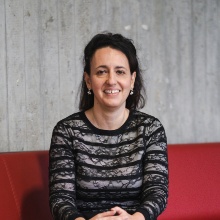Dr. Grazia Lamanna carries out research at the Institute of Aerospace Thermodynamics, and a few days ago submitted her habilitation thesis focusing on droplet dynamics and fuel-injection phenomena. She is part of the Transregio 75 and the Simtech Cluster of Excellence. The mother of two has previous experience working with gender equality issues as Gender Equality Officer of the faculty and the TR75. This time there were a total of four applicants for the position of Gender Equality Officer, and in July the Senate elected Dr. Grazia Lamanna, on the suggestion of the Senate Committee for Diversity and Gender Equality, with Dr. Susanne Becker, Dr. Dietlinde Schmitt-Vollmer and Dr. Annett Udoh serving as her deputies.

A lot of families saw their situation get worse during the corona pandemic, say Lamanna and Radde, and in their experience women in particular were disproportionately affected. In a conversation held to mark the handing over of the role, Prof. Nicole Radde reports on what she focused on during her time in office, and Dr. Grazia Lamanna explains how she plans to develop the role.
Ms. Radde, what achievements during your term of office are you especially proud of, what did you focus on?
Nicole Radde: Family friendliness was a particularly important issue for me. I wanted to improve people’s awareness of it and increase visibility at the University of Stuttgart. While I was in office we more than doubled the number of childcare places available, as well as making other offers which make it easier to promote balancing studies and work with family life visible on the homepage of the Gender Equality Office. We also set up multi-function rooms, for example the parent-child room on the campus in Vaihingen which was opened in 2019 and which can be booked online.
Another important goal was working together with the research networks. My predecessor Dr. Gabriele Hardtmann had already created the pooling concept. We have expanded it in the meantime. Our Pooling Synergies for Equal Opportunities in Collaborative Research Networks is an amalgamation of the University of Stuttgart’s collaborative research projects that are funded by the German Research Foundation (DFG) and enables the research networks to implement joint gender equality activities while also providing a platform for networking and for the exchange of experience on the topic of equal opportunities. Thanks to the pooling system, the funds provided by the DFG should be better utilized. The research networks receive support. We make suggestions, advise doctoral students, plus there are coaching programs and much more.
In my second term in office, we worked together with the Vice Rectorate for Early Career Researchers and Diversity to push the issue of diversity. We have integrated the topic into the structures of the University of Stuttgart and its committees but didn’t want to duplicate any structures. The Senate Committee for Gender Equality for example has become the Senate Committee for Diversity and Gender Equality and the Gender Advisory Council became the Diversity Advisory Council. This isn’t just a case of changing names, it’s also a change of composition and orientation.
Ms. Lamanna, why did you take on the position of Gender Equality Officer?
Dr. Grazia Lamanna: Nicole Radde had written to me. I think it’s an interesting job. Even though things have got a lot better in the area of gender equality over the last few years, there are still a lot of barriers in place for anybody trying to balance studies and work with family life. It’s still very difficult to combine a full-time job working from home with home schooling or looking after children. I’ve been in my position for a few weeks now, and even in this time a lot of students and doctoral students have written to me explaining their situation. Furthermore, I come from a science background myself and have worked as a Gender Equality Officer for the faculty before, which is why I know what kind of problems can arise in this context.
What parts of the job are particularly important to you?
My aims aren’t really any different to those of my predecessor. I also want to make the University of Stuttgart more family friendly. Perhaps now is a good time for this, because the mentality at the University is continuing to evolve. Corona has shown that working from home is easy to implement. Hybrid events in teaching would often be an advantage for students and participants as well as for doctoral researchers in teaching, which means that anybody could flexibly decide which format is better for them depending on their needs. As a participant, I’ve personally found the pooling system in the TR 75 to be very helpful, which is why I want to expand it further.
What kind of things do you want to focus on at the moment?
It is important for us to make managers aware of issues surrounding family friendliness and work-life balance. On the other hand, those affected also need to be informed about their rights and opportunities as well as the University’s obligations as an employer. Here, I will work closely together with the Personnel and Organisational Development department as well as with GRADUS in future. Cooperating with GRADUS systematically is particularly important to ensure that topics can be disseminated on a broad scale and that the resources available can be used effectively.
Another issue is the appointment procedures; here too efforts should be made to make procedures more comparable. The most urgent task at the moment is the publication of the new Structural and Development Plan 2021-2025. This was submitted to MWK at the beginning of October 2020 as a part of SEPUS, but approval has not yet been granted.

Grazia Lamanna
Dr.Gender Equality Officer



